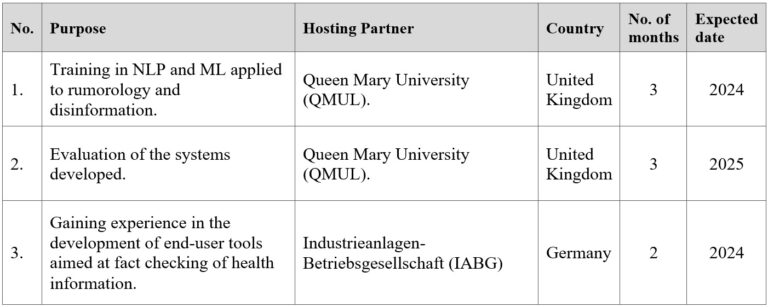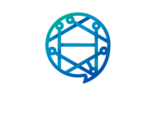DC9: Claim verification for fact-checking
Open Doctoral Candidate/PhD Position at Newtral Media Audiovisual (NEWTRAL), Spain, for the HYBRIDS project
Reference number: HYBRIDS- DC9
PhD research topic: Claim verification for fact-checking
Host institution: Newtral Media Audiovisual (NEWTRAL), Spain
PhD Enrolment: University of Santiago de Compostela (USC), Spain
Main Supervisor: Dr. Rubén Míguez, Newtral Media Audiovisual (NEWTRAL), ruben.miguez@newtral.es
Co-supervisor: Dr. Arkaitz Zubiaga, Queen Mary University (QMUL).
Inter-sectoral Supervisors: Ms. Vindhya Singh and Ms. Stephanie Öttl, Industrieanlagen- Betriebsgesellschaft (IABG)
Objectives:
- To design automated mechanisms to verify political claims. The verification consisting not only into assigning false or true to each claim, but also in supplying more context so as to get a more informative and actionable response;
- Automated retrieval of reliable sources of information that supports or contradicts the claim (or factual assertion);
- To design a strategy to evaluate claim similarity based not on the sentence structure but on the basis of its semantic meaning and context;
- To define a metric to evaluate if two different claims have the same meaning;
- To develop contextual algorithms capable of evaluating claim veracity based on information previously published and develop techniques resilient to “noisy transcripts”.
Expected outcomes:
- Development of a prototype to automatically check the veracity of political claims in real-time. This kind of prototypes would be of great help of live fact-checking of political debates.
- A list of reliable sources for political fact checking and automated tools to look up their content.
- Use cases on climate emergency, immigration, and Euroscepticism.
Planned secondments:

Eligibility Criteria:
- Mobility: At the time of recruitment, the researcher must not have resided or carried out his/her main activity (work, studies, etc.) in Spain for more than 12 months in the 36 months immediately before the recruitment date. Time spent as part of a procedure for obtaining refugee status under the Geneva Convention or compulsory national service are not taken into account.
- The candidate must be at the date of recruitment a doctoral candidate (i.e. not already in possession of doctoral degree). Researchers who have successfully defended their doctoral thesis but who have not yet formally been awarded the doctoral degree will not be considered eligible.
- The candidate must agree to work exclusively for the action.
Specific requirements:
- Degree: All applicants should have a first-class honour degree or equivalent, or a MSc degree, in Computer Science (or a related discipline: Mathematics, Physics…)
- Programming skills: Strong expertise in software development (Python). Knowledge of deep learning frameworks (Pytorch, TensorFlow).
- Language: Excellent command of English, together with good academic writing and presentation skills.
Desirable skills:
- A keen interest in natural language processing and deep learning, specifically for automated detection of fake information.
- Good knowledge of machine learning and deep learning methods. Experience in natural language processing is a plus.
- Basic knowledge working with Python programming frameworks (Flask, Django…). Some basic knowledge on container technologies such as Kubernetes or Docker is a plus.
- Excellent command of Spanish, both spoken and written. DC are expected to read and understand political texts in Spanish.
Contract: Full-time contract
Duration: 36 months, including 4 secondments of 2/3 months each, at other consortium members’ premises (see Secondment section)
Salary: Gross salary of 2,808 €/month (12 payments per year) if the researcher has no family or 3,308 €/month (12 payments per year) if the researcher is married (or a relationship with equivalent status to a marriage recognised by the legislation of the country where this relationship was formalised) or has dependent children for the purposes of the MSCA.
Salary includes medical care coverage and work accident insurance through the Spanish Health Care System, providing access to the Spanish public health care system for candidates, as well as pension and unemployment benefits.
Application Documents:
- Europass CV (template available in the following link), including the names and contact details of two academic references, in English, highlighting the merits that are established as evaluation criteria;
- Scans of Bachelor’s and Master’s transcripts, with certified translation in English (if the degree qualification is not in English); If you have not yet completed your master’s, you must submit a provisional academic transcript.
- A motivation letter in English, highlighting the consistency between your profile and the chosen DC position/s for which you are applying and describing why you wish to be aHYBRIDS Doctoral Candidate to carry out a PhD; (max. 700 words)
- Scanned copy of your ID card, resident’s card or passport currently in force;
- Proof of excellent command of English (e.g., IELTS, TOEFL, Cambridge or equivalent). This is not required in case you are a native English speaker (i.e., English is your mother tongue).
In addition, you can add any other documents which you find relevant for the applications such as Master thesis, publications or project reports.
Evaluation criteria:
- Academic background (up to 40 points)
- Knowledge and specific achievements (up to 35 points)
- Shortlisted candidates will be invited for an interview in which the selection committee will assess the applicant’s communication skills, initiative, and motivation to pursue a PhD. (up to 25 points)
Deadline: April 26, 2023, at 23h59 CET (UCT + 01:00)

CLOSED
Candidates are encouraged to contact the HYBRIDS Project Manager (info@hybridsproject.eu) for assistance or for any information related to the application process. When contacting, please indicate the position reference in the subject line.
Enquiries about research content must be sent to the main PhD supervisor via email (see contact details in Supervisors section).
